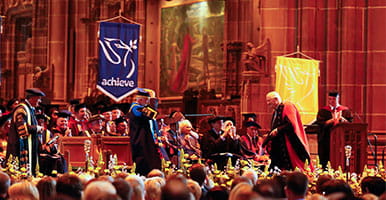Sir Robin Knox-Johnston CBE
Presented by Professor Frank Sanderson
Honorable Pro-Chancellor, I have pleasure in presenting Sir Robin Knox Johnston for the award of an Honorary Fellowship of Liverpool John Moores University.
"I see that Eric Tabarly is building a trimaran…. I wonder whether he's going to try to go round the world non-stop. That's about all there's left to do now". So said David Knox-Johnston to his son Robin in March 1967.
Robin knew the Frenchman Tabarly was quite capable of doing it but felt not only that a Briton should be the first but also, if a Frenchman succeeded, "we'd never here the last of it". This was all the motivation Robin Knox-Johnston needed to complete the first single-handed non-stop circumnavigation of the world in 1969 and achieve yachting immortality after 312 days at sea and covering over 30,000 nautical miles.
Robin set sail from Falmouth in The Sunday Times Golden Globe race in his wooden ketch 'Suhaili' in June 1968. By the Cape of Good Hope, he was in the lead, but with his radio out of action, which meant no accurate time checks and no weather forecasts for the rest of the voyage.
After surviving storms with 25-metre high waves in the Southern Ocean, the self steering failed off Australia. And despite him suffering from appendicitis at the Equator on the home stretch, Suhaili sailed into Falmouth Harbour on 22nd April 1969 .
At the time, it was the lengthiest voyage ever made. Later that year he published A World of My Own, a widely acclaimed account of the voyage, and this has been followed by many other books on the sea and seamanship over the years. He has also given countless inspirational lectures, not least at this university last year when he delivered a seaman's perspective on citizenship in our Roscoe Lecture Series.
Robin Knox-Johnston was born in Putney on St Patrick's Day 1939, the eldest of 4 brothers. During the War, the family moved to Liverpool and were bombed out of a flat in New Brighton before moving to Heswall on the Dee Estuary where he first developed an interest in boats and the sea.
After the War, he attended school in Hertfordshire, and excelled in individual sports, but was the only pupil to show any interest in a career at sea. At 17, he decided to join the Royal Navy but failed the compulsory Physics examination for entrants.
Many students, past and perhaps present, will identify with his reflections on this failure: Whilst Physics is an integral and fascinating part of everyday life in both the Merchant and Royal Navies, I believe the reason for my failure was that I had difficulty applying the theories and experiments of the General Certificate syllabus to any practical problems that came my way.
In 1957, he joined the Merchant Navy, working for the British India Company.
By 1963, he was a First Mate, married to Suzanne with a baby daughter, Sara, and living in Bombay. By early 1967, he was back in England and entertaining the first thoughts of a non-stop voyage around the world.
After his epic achievement, Robin left the merchant navy and developed a number of marinas: Mercury Marina on the Hamble, London's St. Katharine's Dock and Troon Marina in Scotland. He remained a naval reservist until 1989, reaching the rank of Lieutenant Commander.
He has had many ocean racing successes over the years, including winning the Jules Verne Trophy with Peter Blake for the fastest non-stop circumnavigation of the world in 74 days.
And he has not finished yet: in October, he takes part in the Velux Five Oceans Single-handed Round the World Race - once a competitor, always a competitor. In 1993 Robin became President of the Sail Training Association, an organisation which oversees the Tall Ships races and offers sailing ship experience as a means of development of young people. Before he stepped down in 2002 £11 million had been raised for the purchase of new and larger sailing ships.
Also in 1992 he became a Trustee of the National Maritime Museum at Greenwich, and remains a Trustee of the National Maritime Museum at Falmouth which opened in 2003.
He was appointed to the Sports Lottery Panel at its inception in 1995, and from 1999 until 2002 served as a member of the English Sports Council. He is also founder and chairman of Clipper Ventures, a company focused on developing and promoting major sailing events and which owns the rights to the Clipper Round the World Yacht Race. The current race started Liverpool in September 2005 and finished in Liverpool on Saturday 29 July.
There's only time today to mention a handful of the awards and the medals of honour accumulated by Robin during his illustrious career:
- In 1969, he was awarded the CBE
- He is a Freeman of the City of London
- He has Honorary Doctorates from Maine Maritime Academy and The University of Southampton
- In 1992, he was awarded the Royal Institute of Navigation's Gold Medal for experiments with renaissance navigation, and elected a Fellow in 1994
- He was awarded The Maritime Trust's Cutty Sark Medal in 1994
- He was the International Yacht Racing Union World Sailor of the Year in 1994
- He was twice UK Yachtsman of the Year
In 1995, he was knighted for his many achievements and services to the country.
He is an honorary member of numerous yacht clubs, including the Royal Yacht Squadron, Royal Naval Sailing Association, Royal Irish Yacht Club, and the Royal Southampton Yacht Club.
Robin Knox-Johnston's achievements in life are underpinned by a fierce determination to succeed and traditional values such as self-reliance, caring for others, teamwork, and the great value of competition and learning to pick yourself up when you lose.
Almost 4 decades ago, he became a national hero and he has continued to be an inspiration to countless people, young and not so young, ever since. He is a most worthy recipient of an honour today.
Thus I have pleasure in presenting Sir Robin Knox-Johnston, this most distinguished friend of our region, for admission to our highest honour of Fellow of Liverpool John Moores University.



